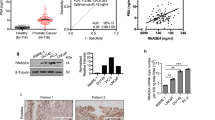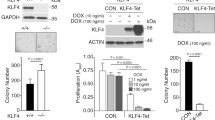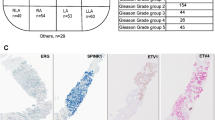Abstract
The ability to identify prostate tumor or prostate tissue specific genes that are expressed at high levels and use their protein products as targets could greatly aid in the diagnosis and treatment of prostate cancer. Using a polymerase chain reaction (PCR)-based subtraction technique, we have recovered the recently described KLK4 (prostase) gene from human prostate cDNA. In this study, KLK4 gene expression in human prostate tumors was further characterized using cDNA quantitative PCR and immunohistochemistry, demonstrating that the gene is specifically expressed at both the mRNA and protein levels in normal human prostate tissue, and in both primary and metastatic prostate tumor samples. Quantitative mRNA analysis also demonstrated low level expression including adrenal gland, salivary gland and thyroid. Finally, it was demonstrated that prostate cancer patient sera contain antibodies that bind specifically to recombinant KLK4 protein. This antibody has been used to detect KLK4-specific peptides in epitope mapping experiments. The relatively specific expression profile and elevated level of KLK4 mRNA and protein in both tumor and normal prostate tissues, in addition to detectable KLK4-specific antibody in cancer patient sera, supports additional efforts to determine if KLK4 can play a role in the diagnosis of prostate cancer, the monitoring of residual disease, or act as a target for immunotherapy.
This is a preview of subscription content, access via your institution
Access options
Subscribe to this journal
Receive 50 print issues and online access
$259.00 per year
only $5.18 per issue
Buy this article
- Purchase on Springer Link
- Instant access to full article PDF
Prices may be subject to local taxes which are calculated during checkout




Similar content being viewed by others
References
Abi-Aad AS, Macfarlane MT, Stein A, deKernion JB . 1992 J. Urol. 147: 952–955
Babcook JS, Leslie KB, Olsen OA, Salmon RA, Schrader JW . 1996 Proc. Natl. Acad. Sci. USA 93: 7843–7848
Chen YT, Scanlan MJ, Sahin U, Tureci O, Gure AO, Tsang S, Williamson B, Stockert E, Pfreundschuh M, Old LJ . 1997 Proc. Natl. Acad. Sci. USA 94: 1914–1918
Daher R, Beaini M . 1998 Clin. Chem. Lab. Med. 36: 671–681
Diatchenko L, Lau YF, Campbell AP, Chenchik A, Moqadam F, Huang B, Lukyanov S, Lukyanov K, Gurskaya N, Sverdlov ED, Siebert PD . 1996 Proc. Natl. Acad. Sci. USA 93: 6025–6030
Diatchenko L, Lukyanov S, Lau YF, Siebert PD . 1999 Methods Enzymol. 303: 349–380
Dong Y, Kaushal A, Loan B, Chu S, Fuller PJ, Nicklin J, Samaratunga H, Clements JA . 2001 Clin. Cancer Res. 7: 2363–2371
DuPont BR, Hu CC, Reveles X, Simmer JP . 1999 Cytogenet. Cell. Genet. 86: 212–213
Grenlee RT, Murray T, Bolden S, Wingo PA . 2000 CA Cancer J. Clin. 50: 7–33
Houghton RL, Dillon DC, Molesh DA, Zehentner BK, Xu J, Jiang J, Schmidt C, Frudakis A, Repasky E, Filho AM, Nolasco M, Badaro R, Zhang X, Roche PC, Persing DH, Reed SG . 2001 Mol. Diagn. 6: 79–91
Myers SA, Clements JA . 2001 J. Clin. Endocrin. Metab. 86: 2323–2326
Nakai K, Kanehisa M . 1992 Genomics 14: 897–911
Nelson PS, Gan L, Ferguson C, Moss P, Gelinas R, Hood L, Wang K . 1999 Proc. Natl. Acad. Sci. USA 96: 3114–3119
Obiezu CV, Scorilas A, Katsaros D, Massobrio M, Yousef GM, Fracchioli S, Rigault de la Longrais R, Arisio R, Diamandis EP . 2001 Clin. Cancer Res. 7: 2380–2386
Sissons GR, Clements R, Peeling WB, Penney MD . 1992 Br. J. Radiol. 65: 861–864
Stephenson SA, Verity K, Ashworth LK, Clements JA . 1999 J. Biol. Chem. 274: 23210–23214
Thiounn N, Saporta F, Flam TA, Pages F, Zerbib M, Vieillefond A, Martin E, Debre B, Chevillard S . 1997 Urology 50: 245–250
Watson MA, Dintzis S, Darrow CM, Voss LE, DiPersio J, Jensen R, Fleming TP . 1999 Cancer Res. 59: 3028–3031
Yousef GM, Obiezu CV, Luo LY, Black MH, Diamandis EP . 1999 Cancer Res. 59: 4252–4256
Acknowledgements
This work is supported in part by grant CA76822 from the National Institutes of Health and by a Prostate Cancer Initiative Clinical Trials Grant from the Cancer Research Institute. Some antibodies provided in support of this work were contributed by Dr Teresa Cabezon of GlaxoSmithKline, Rixensart, Belgium. We thank Dr Thomas S Vedvick, Dr Jiangchun Xu, Sandra Koseoglu and Joe Parsons of Corixa Corporation for expert protein characterization, cDNA library construction, mRNA analysis and DNA sequencing respectively. We thank Dr Samuel Li for baculoviral recombinant protein synthesis, and Dr Darrick Carter and Charisa Cornellison for bac-protein purification, also of Corixa Corporation. Some tissue samples were obtained from the Cooperative Human Tissue Network, which is funded by the National Cancer Institute, and from the National Disease Research Interchange.
Author information
Authors and Affiliations
Corresponding author
Rights and permissions
About this article
Cite this article
Day, C., Fanger, G., Retter, M. et al. Characterization of KLK4 expression and detection of KLK4-specific antibody in prostate cancer patient sera. Oncogene 21, 7114–7120 (2002). https://doi.org/10.1038/sj.onc.1205786
Received:
Revised:
Accepted:
Published:
Issue Date:
DOI: https://doi.org/10.1038/sj.onc.1205786
Keywords
This article is cited by
-
Prostate-specific markers to identify rare prostate cancer cells in liquid biopsies
Nature Reviews Urology (2019)
-
Human kallikrein 4 signal peptide induces cytotoxic T cell responses in healthy donors and prostate cancer patients
Cancer Immunology, Immunotherapy (2012)
-
The emerging roles of human tissue kallikreins in cancer
Nature Reviews Cancer (2004)



